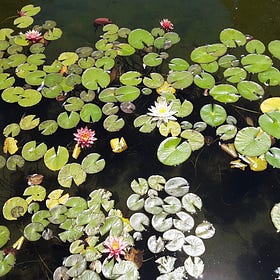I've been thinking about the Buddhist notion of non-attachment.
To most English speakers, "non" means "no" or "none". So, NO attachment. Detachment. Disconnection. Not caring.
Words matter as packages of meaning. If Buddhism is an operations manual for less suffering and more well-being, I don't believe a prescription of "NO attachment” is aligned with our human nature. Attachment, connection and caring are important survival programs as well as the source of much of our joy in living.
It is also true that when our bonds of attachment are threatened or broken, we experience some of our most intense suffering (anxiety, sadness, grief). So it might seem smart to remain UN/NON-attached in order to avoid the pain and grief of conflict and loss. But then we sacrifice all the joys that bloom from those loving caring connections.
What to do?
Paging Dr. Goldilocks
In life, there is always a middle way between the simple clear poles of opposites. So in terms of living the good life, we can all seek to avoid either extreme of attachment, too much or not enough. We can aim to find the "just right" level of connection that is best for our own (and others’) well-being.
That sublime balance point is not a formulaic or static one-and-done. It will vary across situations and people and stages of our lives. Finding the middle way of attachment requires continuous experimentation and contemplation.
Let’s replace the word NON-attachment with RIGHT attachment. Right attachment involves maintaining the optimal degree of separateness from other people and things as well as from our own thoughts and emotions. Think of this as establishing a shimmering boundary that brings us into communion with everything in ourselves and the world without a loss of balance and perspective.
When built and maintained correctly, this semi-permeable membrane will enable us to savor all of life while protecting us from the suffering and even death that can come from too much or too little attachment.
More thoughts on the meaning and practice of Buddhism ⬇️
The heart of buddha-ism
I believe that the "buddhist" paradigm for well-being and right living is one of the very best available to us. Thousands of volumes have been written on this subject in many languages with widely divergent perspectives. This can make it difficult to grasp the essential elements. Following Einstein’s dictum that “Things sho…





It’s always fascinating how attached people can be to material things, unwilling to give them up. When you really dig deep, there are plenty of ways to simplify life, live on a lower income, or even retire early. But the attachment to goods and the constant need to consume often holds people back from making those changes.
"replace the word NON-attachment with RIGHT attachment" This is far more digestible and practical for those seeking a proactive yet well balanced life. Great work, Baird.